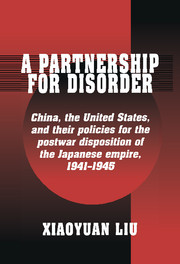 A Partnership for Disorder
A Partnership for Disorder Book contents
- Frontmatter
- Contents
- Acknowledgments
- Note on romanization
- Abbreviations
- Introduction
- 1 The making of an alliance
- 2 The issue of postwar Japan
- 3 China's lost territories
- 4 Korea's independence
- 5 The road to Cairo
- 6 A divisive summit
- 7 Yan'an and postwar East Asia
- 8 Diplomacy without action
- 9 Erosion of a partnership
- 10 The Manchurian triangle
- 11 Bargaining at Moscow
- 12 Epilogue: The crisis of peace
- Appendix I Guiding Plan for Helping the Korean Restoration Movement
- Appendix II Two Chinese documents of the Cairo Conference
- Bibliography
- Index
Appendix I - Guiding Plan for Helping the Korean Restoration Movement
Published online by Cambridge University Press: 20 October 2009
- Frontmatter
- Contents
- Acknowledgments
- Note on romanization
- Abbreviations
- Introduction
- 1 The making of an alliance
- 2 The issue of postwar Japan
- 3 China's lost territories
- 4 Korea's independence
- 5 The road to Cairo
- 6 A divisive summit
- 7 Yan'an and postwar East Asia
- 8 Diplomacy without action
- 9 Erosion of a partnership
- 10 The Manchurian triangle
- 11 Bargaining at Moscow
- 12 Epilogue: The crisis of peace
- Appendix I Guiding Plan for Helping the Korean Restoration Movement
- Appendix II Two Chinese documents of the Cairo Conference
- Bibliography
- Index
Summary
General Program
pursuance of the teaching of the late Premier [Sun Yat-sen] about Three People's Principles and giving assistance to weak nations, [this party works for] the establishment of permanent peace in East Asia, and actively supports the Korean revolutionary organizations in China in order to strengthen them and to reestablish an independent Korean state.
Principles
This party should treat all Korean revolutionary groups in China with friendly spirit and sincere and warm attitudes.
During the anti-Japanese war, Korean revolutionary organizations should coordinate their activities with the need of Chinese military authorities and take practical part in resistant actions to accelerate the collapse of the Japanese imperialism.
The zongcai [director-general, i.e., Chiang Kai-shek] will appoint a three-member guiding group responsible for contacting and advising the Korean revolutionary organizations in China; and the financial need of these organizations should be met with loans in the name of the party.
Methods
At the proper time, the Chinese government ought to take the lead among the Allies in granting recognition to the Korean Provisional Government; the timing and the procedure of recognition should be decided by the guiding group in accordance with the zongcai's instruction, and then the Waijiaobu should complete necessary steps.
[…]
- Type
- Chapter
- Information
- A Partnership for DisorderChina, the United States, and their Policies for the Postwar Disposition of the Japanese Empire, 1941–1945, pp. 306 - 307Publisher: Cambridge University PressPrint publication year: 1996
